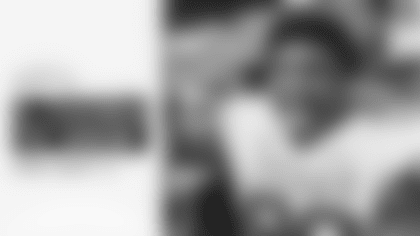By his own account, Sidney Jones IV didn't have to face a ton of adversity for most of his life leading up to his final year at the University of Washington, and that was particularly true when it came to football.
After being a standout player on a successful West Covina High School team, Jones went on to become a three-year starter and eventually one of the nation's top cornerbacks with the Huskies, looking like a potential first-round pick when he decided to forgo his senior season for the 2017 draft.
But then Jones' football career took a dramatic turn when he tore his Achilles during Washington's pro day, an injury that caused him to fall to the second round of the draft. Jones missed almost his entire rookie season with the Philadelphia Eagles, then during his next two seasons he struggled to earn consistent playing time, in part due to more injuries. Jones was eventually cut by the team that drafted him, then later traded away from his second team, Jacksonville, for a sixth-round pick.
Those on-field struggles took Jones to a dark place, leading him to battle depression and anxiety. It took some time, but Jones eventually found help in the form of a therapist, a decision that helped improve both his quality of life and his play on the field. That journey is why, when Seahawks players wore custom cleats for last season's My Cause, My Cleats game, Jones proudly sported a pair of pink shoes with the name and logo of Mental Health America, a non-profit dedicated to addressing the needs of those living with mental illness and promoting the overall mental health of all.
And it's also why Jones is encouraged by the launch of the Seahawks' new mental health program, Mental Health Matters.
"It's really important to me because it's something I've been through personally," said Jones, who joined the Seahawks via trade with Jacksonville prior to the start of last season. "Growing up, I never really faced too much adversity, never had too many hardships. It was kind of an easy road—good at football, everything was going up and up. Then I sustained the Achilles injury before the draft, and that was a big shock for me. First surgery, first major injury, and that took me through some dark times. I tried to stay positive about it, but I had a moment where I just didn't feel like myself, and that was weighing on me. I didn't notice I needed help until maybe a couple of years down the road, and I never really got a chance to talk about it. But coming out of that, coming out of that dark space, I got some help, talked to a therapist and figured out a way."
Mental Health Matters is a program that will focus on destigmatizing, normalizing and encouraging conversations around mental health. The Seahawks will partner with the National Alliance on Mental Illness (NAMI) to provide resources and steps to get help, while also providing warning signs of mental illness and what to do when those signs are present, including steps to get proper help.
"If you're going through tough times and adversity hits, you need somebody to talk to, you need a support system," Jones said. "Some people have different support systems—family, friends, therapists—and mine just happened to be a therapist who helped me out, and my wife, she was there along this process with me. It's been a good journey just learning about mental health, learning the importance of it, because those dark days that you face sometimes, and there's always a brighter side through talking about it and having a support system, being vocal about it and not being in your own box, I feel like helped the process of getting back to who I was."
Getting back who he was helped Jones enjoy the best season of his career with the Seahawks in 2021, establishing career highs in games played (16), starts (11), passes defensed (10) and tackles (66). He also believes that being healthier mentally helped him stay healthier from a physical standpoint.
"My mental health was coming out through injuries," he said. "I feel like the anxiety and depression kind of manifested through my body, and you need your body to perform. Everything was correlated, my mental wasn't right, and it was showing up in my profession. Just making sure the mental is right, because the mental controls everything. So that's very important to bring awareness to just so everyone gets a chance to be the best version of themselves."
A big part of mental health, particularly when it comes to NFL players, is creating an environment where players know that it's OK to acknowledge that they might need help and that it's OK to seek out that help. As former Seahawks linebacker Bobby Wagner said last year when discussing mental health, “It’s OK not to be OK, and it’s OK to look for somebody to help you out through that process.”
For Jones, three years of therapy, as well as the support of his wife, has helped him get to a better place, and he is now willing to be open about his own struggles so that others, be it a teammate or just a football fan who happens to hear his story, know that they too can seek out the help they might need.
"That's very important," Jones said. "I think just talking and being open, being vulnerable to somebody—you can put on your front to everybody else, but you've got to find that person that's a safe space for you, because we all deal with things, it's just how we deal with them."
With 1 in 5 U.S. adults experiencing mental illness, including 17 percent of youth ages 6-17 years, and with 50 percent of lifetime mental illness beginning by age 14, Mental Health Matters will have an emphasis on youth and on the Black community.
"The more that we're bringing awareness and the more that people are talking about it, it allows people who aren't athletes to know that, regardless of where you are in whatever aspect of life that you're going to be dealing with something," said receiver Tyler Lockett. "Now the next step for us is being able to try to allow safe spaces to be given."
Lockett has been a strong advocate for destigmatizing conversations about mental health, brining up his own struggles with anxiety and depression in press conferences in recent years, and also addressing those struggles through his poetry. Lockett sees a world in which people present a sanitized version of their lives on social media and worries that people will be afraid to admit that everything isn't perfect in their own world.
"We don't normalize that we make mistakes, we don't normalize that we lose games, we don't normalize that life happens and trials happen, and because of that we get this perception in our heads that everything has to go a certain way—you've got to be successful by 20-something, and life isn't supposed to look like this and look like that," he said. "The more that we're able to normalize that life is going to look different for everybody, we're able to allow people to deal with their mental health and sit with it rather than looking at all the highlights on social media, looking at everything that's going right for somebody because we never get to see what's not.
"A lot of times people go through things behind closed doors and you never really know their battles. We carry it with us because we think we're the only ones… It makes it harder and harder to be vulnerable in today's world, because we don't appreciate vulnerability until somebody commits suicide or until somebody does something to themselves in a way that they're crying for help."
For Lockett, a goal of sharing his own mental health struggles is creating a safe environment where people are more comfortable being vulnerable.
"Not everyone is able to do that because they don't have their safe places, they might not be able to pay for therapy, they might night be able to seek the kind of help they need," he said. "We've just got to normalize a lot of things rather than making like this big old thing that we think it's supposed to be, because that doesn't allow you to be content, it makes you want to keep chasing."
To learn more, about how we are encouraging the conversation around Mental Health visit seahawks.com/communityresponse.
Warning Signs of Mental Illness:
- Feeling very sad or withdrawn for more than two weeks
- Trying to harm or end one's life or making plans to do so
- Severe, out-of-control, risk-taking behavior that causes harm to self or others
- Sudden overwhelming fear for no reason, sometimes with a racing heart, physical discomfort or difficulty breathing
- Significant weight loss or gain
Worried about yourself or someone you care about?
- If you notice any of these symptoms, it's important to ask questions
- Try to understand what they're experiencing and how their daily life is impacted
- Making this connection is often the first step to getting treatment
Steps to take:
- Talk with a health care professional
- Learn more about mental illness
- Take a mental health education class
- Join a support group
- Call the NAMI HelpLine at 800-950-NAMI (6264)














